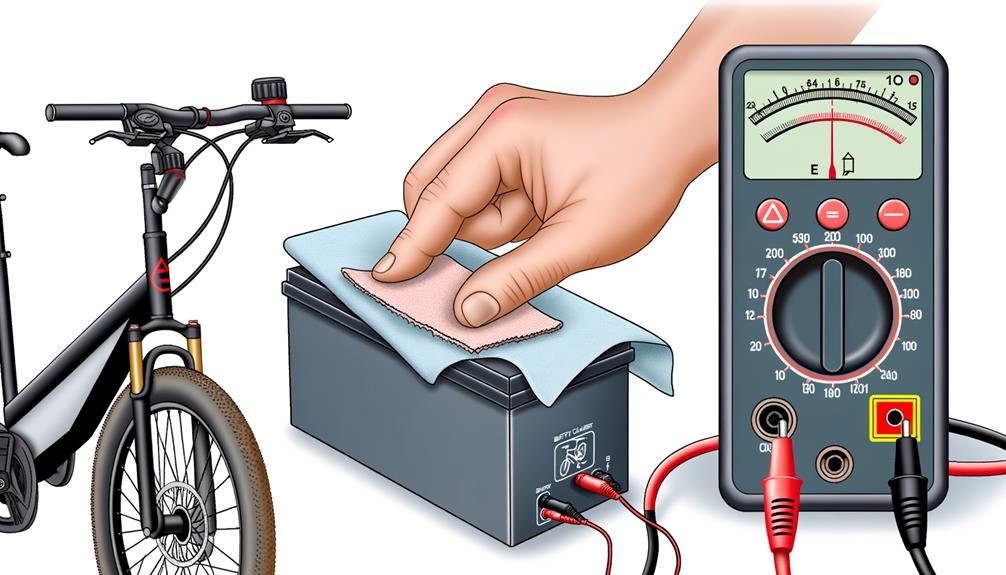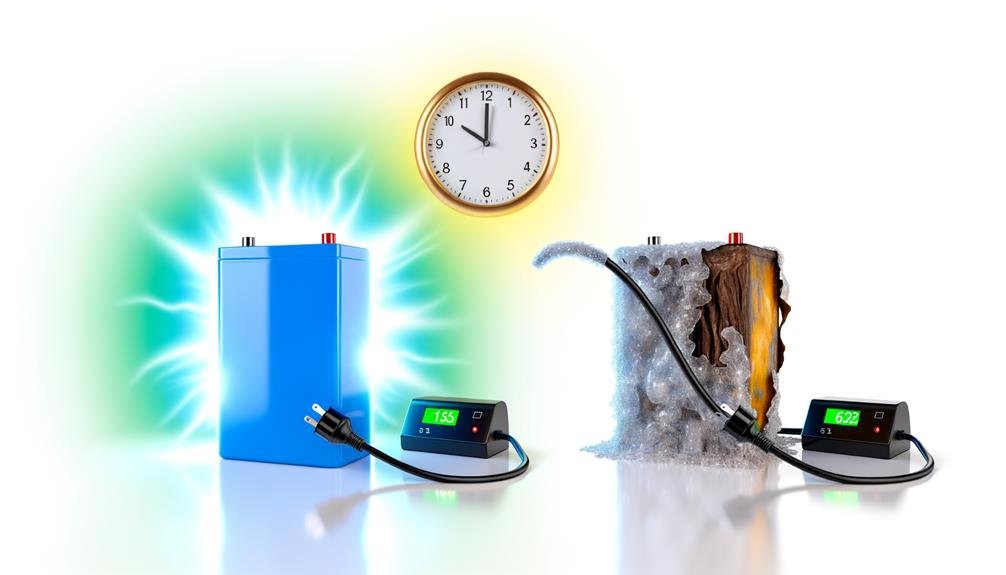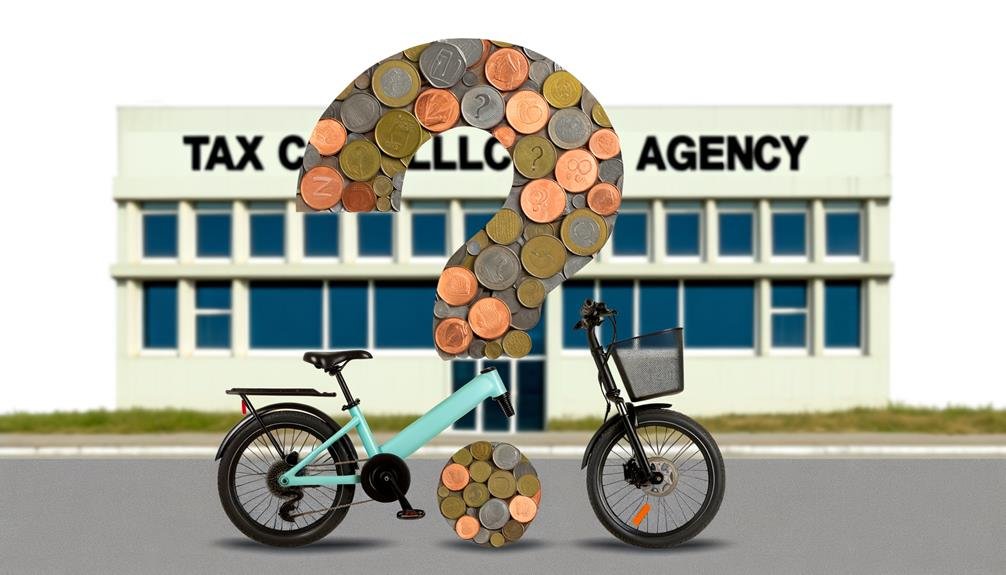Charles Miller is a veteran bike enthusiast with over 12 years of experience dealing with bikes as a mechanic. Despite immense love and expertise for...
Navigating the world of e-bike batteries is much like exploring an intricate maze, with twists and turns at every corner. We're here to shed light on one of the most commonly asked questions: Can you overcharge an e-bike battery?
Overcharging batteries has been a concern since the advent of rechargeable power sources and it's quite a valid one. It's no secret that batteries have a finite lifespan, but might overcharging be the sinister force that's cutting this life short?
As we venture further into this matter, we'll discover the effects of overcharging and how it impacts your e-bike's performance and battery longevity. Stick with us as we unravel this mystery and arm you with the knowledge to keep your e-bike running smoothly for years to come.
- Key Takeaways
- Understanding Electric Bike Batteries
- The Possibility of Overcharging
- Implications of Overcharging
- Preventing Battery Overcharging
- E-Bike Battery Maintenance Tips
- Common Battery Care Mistakes
- Extending E-Bike Battery Lifespan
- Replacing Your E-Bike Battery
- Frequently Asked Questions
- Conclusion
Key Takeaways
- Overcharging an e-bike battery can significantly reduce its lifespan and performance.
- Using the correct charger and following manufacturer guidelines are crucial to prevent overcharging.
- Avoiding overcharging helps maximize battery lifespan and prevent safety hazards such as thermal runaway or fire.
- Regular maintenance, proper storage, and monitoring of the battery's charge level are essential to prevent overcharging and optimize battery performance.
Understanding Electric Bike Batteries
Diving into the heart of electric bikes, we find the rechargeable batteries, available in various shapes, sizes, and voltages, that power these innovative machines. There are different types of e-bike batteries such as lead-acid, nickel-cadmium, nickel-metal hydride, and lithium-ion batteries. Each type brings unique advantages and disadvantages, impacting the performance and lifespan of an e-bike.
Lead-acid batteries are commonplace due to their affordability, though they're heavy and have a shorter lifespan. On the other hand, lithium-ion batteries, while pricier, are lighter, offer more power, and extend the e-bike's life due to their longer lifespan.
The lifespan of your e-bike's battery isn't only determined by its type but also by how you use and care for it. Overcharging, for instance, can shorten your battery's lifespan significantly. Hence, it's crucial to avoid overcharging your battery.
Electric bike battery charging should be done using a compatible charger to prevent damage. Using an incompatible charger can result in overcharging, leading to reduced battery life. In essence, to prolong the life of your e-bike, ensure you charge your e-bike properly and avoid overcharging.
The Possibility of Overcharging
While proper charging practices are paramount in maintaining an e-bike's battery life, it's equally important to understand the detrimental effects of overcharging. Overcharging an e-bike battery can severely reduce its lifespan and performance. This is caused by excessive heat and pressure build-up in the battery cells, which can lead to premature failure.
Following the correct charging methods is crucial to prevent overcharging. Always charge your battery using the right charger, as each charger is designed to stop supplying power once the battery is fully charged. Ignoring this rule may result in overcharging, damaging the battery cells, and shortening the lifespan of your battery.
Further, proper battery care involves more than just the charge cycles. If you're planning on storing your e-bike for extended periods, it's advisable to keep the battery comfortably below 80% charge. This slows down the rate of self-discharge and helps maintain the battery's condition.
Implications of Overcharging

Let's now turn our attention to the implications of overcharging an ebike battery.
Two primary concerns arise: the impact on battery life and the potential safety risks.
It's imperative we comprehend these issues to ensure our batteries not only perform efficiently, but also maintain their integrity for a safe ride.
Battery Life Impact
Overcharging an e-bike battery not only reduces its capacity and lifespan, but can also lead to serious safety hazards such as thermal runaway or fire. The battery life impact is significant and can be detrimental to your e-bike's performance. Leaving your battery on the charger overnight, or for extended periods, can lead to overcharging, negatively affecting its longevity.
To maximize your e-bike battery lifespan, it's essential to avoid overcharging. This means not keeping your battery fully charged all the time and avoiding extreme temperatures, both of which can reduce its lifespan. Regular maintenance and following the manufacturer's guidelines for charging the battery are also crucial.
Safety Risks Involved
In addition to impacting the lifespan and performance of e-bike batteries, overcharging also introduces serious safety risks that warrant our attention. Not only does overcharging damage the battery, but it can also cause irreversible damage and reduce the battery's lifespan significantly.
Here are some of the safety risks involved:
- Overcharging may lead to thermal runaway or fire, especially when dealing with lithium-ion batteries.
- It puts excessive stress on the battery cells, speeding up degradation.
- Using an unsuitable charger or neglecting manufacturer guidelines can easily lead to overcharging.
- Even after the battery is fully charged, leaving the e-bike plugged into the charger can lead to overcharging.
Therefore, to avoid overcharging, it's essential to unplug the charger once the battery is fully charged.
Preventing Battery Overcharging
To prevent your e-bike battery from overcharging, it's crucial to use the charger recommended by the manufacturer. This is because each charger is designed to provide the optimal charge to the battery and reduce the risk of overcharging.
It's important to avoid overcharging as it can lead to reduced battery life and performance. Always use the charger that came with your e-bike, and avoid using generic chargers that may not have the proper safety features.
When you plug in your e-bike, make sure to monitor the charging process. Don't leave the battery plugged in for too long, as this could lead to overcharging. When the battery is fully charged, unplug the charger. This helps maintain the battery's optimal performance and longevity.
It's also a good practice to charge the battery before each ride, to prevent overcharging.
E-Bike Battery Maintenance Tips

While preventing overcharging is a crucial aspect of e-bike battery care, there are also several other maintenance tips that can help optimize battery performance and longevity. Proper e-bike battery maintenance can prolong the life of your battery, ensure your bike's optimal performance, and save you from unnecessary costs of battery replacement.
It's important to always use the right charger for your e-bike battery. The charger should be the one recommended by the manufacturer to prevent any irreversible damage to your battery. Lithium batteries, which are commonly used in e-bikes, are particularly delicate and can be damaged easily by using the wrong charger.
Store your batteries in a dry place away from direct sunlight or heat sources. This can help maintain the battery's optimal performance.
Regularly check and manage your battery levels. This can help you plan your rides better and avoid unexpected power depletion.
Clean your e-bike battery regularly. This will maintain its overall health and performance.
Common Battery Care Mistakes
Despite our best efforts, we often make a handful of common battery care mistakes when it comes to e-bike battery care, which can significantly hinder the battery's performance and lifespan.
A frequent mistake is overloading your bike, which can strain the battery, reducing its charging capacity and lifespan. Another common error is not using the right charger for your battery or not charging it at the appropriate charging time.
Avoid the temptation to leave your battery on a charger beyond its full charge. Overcharging can harm any battery, and ebike batteries are no exception. "Can you overcharge an ebike battery?" Yes, you can, and it's a mistake you must avoid.
We've put together this table to summarize some common battery care mistakes:
| Mistake | Consequence | Solution |
|---|---|---|
| Overloading Your Bike | Reduced Battery Lifespan | Avoid Overloading |
| Incorrect Charging Time/Charger | Poor Battery Performance | Use the Right Charger as Soon as Possible |
| Leaving Your Battery Charging Beyond Full | Overcharged Battery | Remove Battery from Charger After Full Charge |
Extending E-Bike Battery Lifespan

Proper care and maintenance can significantly extend the lifespan of your e-bike battery, starting with good charging habits. By understanding the limitations of the battery's lifespan and knowing how to care for it, we can ensure that you get the most out of your e-bike.
Check the battery regularly: this includes ensuring it's not left discharged for extended periods and keeping an eye on its overall health.
Use your e-bike frequently: regular usage keeps the battery charged and in good working condition.
Store properly: keep the battery in a cool, dry place to prevent damage.
Know when to replace the battery: e-bike batteries have a limited lifespan. If you notice a decrease in performance, it may be time for a replacement.
The question 'can you overcharge an ebike battery' is often asked. The answer is yes, and it can cause significant damage. So remember to avoid leaving your battery plugged in once it's fully charged.
Replacing Your E-Bike Battery
As we shift our focus to replacing your e-bike battery, it's crucial we cover three key areas.
First, we'll guide you in choosing the right battery for your specific e-bike and riding needs.
Then, we'll discuss the proper installation methods.
Choosing the Right Battery
When it comes to replacing your e-bike battery, understanding the different types, including lead-acid, nickel-cadmium, nickel-metal hydride, and lithium-ion, along with their respective pros and cons is crucial. Choosing the right battery depends on your usage pattern and the performance and lifespan you expect from your e-bike.
Here are some points to consider:
- Check the battery regularly to monitor its charge level
- Choose a battery that fits your need and use of the electric bike
- Adhere to proper maintenance practices to extend the battery's life
- Seek additional information about the battery's storage and handling
Proper Battery Installation
To ensure optimal performance and safety, it's crucial that we install our e-bike batteries correctly. Proper battery installation begins with using a charger recommended by the manufacturer. This counters the question, 'can you overcharge an ebike battery?' and helps maintain full capacity.
Checking the battery prior to each ride is essential. If the battery isn't recommended for use, it must be replaced to prevent issues that could reduce its lifespan.
Furthermore, it's vital to store your battery properly. A cool, dry place is optimal for Storing the Battery, which should always be kept charged. Improper storage or allowing the battery to drain completely can significantly impact its lifespan and performance.
E-Bike Battery Maintenance
In maintaining your e-bike battery, understanding the type of battery your e-bike uses and how to properly care for it is key to extending its lifespan and ensuring optimal performance. It's crucial for e-bike owners to keep in mind that batteries have a limited lifespan. However, good e-bike battery maintenance can extend it.
Always follow the charging practices recommended by the manufacturer. Don't overcharge – it's best to unplug once the battery is at a full charge.
Keep the battery in good physical condition by avoiding extreme temperatures and protecting it from moisture. Regularly inspect the battery for any signs of damage or wear, and address any issues promptly.
Proper care of your e-bike also includes storing the battery properly. When not in use, store the battery in a cool, dry place and avoid exposing it to direct sunlight. It's also a good idea to remove the battery from the e-bike if it will not be used for an extended period of time.
Frequently Asked Questions
Can I Leave My Ebike Charging Overnight?
We can leave our ebike charging overnight due to smart chargers' automatic cut off, preventing overcharging risks. However, for optimal battery lifespan and charge efficiency, we should monitor charge indicators and avoid potential battery overheating.
Is It OK to Not Fully Charge a Ebike Battery?
Yes, partially charging an e-bike battery is fine. It can even extend battery lifespan. We'd recommend maintaining an optimal charge level for efficient power use. Remember, good charging habits and safety measures are crucial.
What Happens When an E-Bike Runs Out of Charge?
When our e-bike's battery runs out, we lose power assistance which makes distance coverage tougher. We're left with manual pedalling, affecting our cycling experience. This signals a need for proper battery maintenance to ensure its lifespan and durability.
How Long Should I Charge My Ebike Battery?
We're often asked, "how long should I charge my ebike battery?" It's best to follow manufacturer's instructions for optimal charge, using correct chargers and respecting charging intervals to maximize battery lifespan and minimize power consumption.
Conclusion
In sum, we'd be wise to treat our e-bike batteries with the utmost respect. Overcharging isn't just a hypothetical worry, but a very real one that can seriously hamper our battery's performance and longevity.
But with careful charging, regular check-ups, and a bit of TLC, we can gently coax a longer life out of our batteries. After all, our e-bikes can only keep us moving as long as their batteries are up to the task.

Charles Miller is a veteran bike enthusiast with over 12 years of experience dealing with bikes as a mechanic. Despite immense love and expertise for his Tacoma, he rides his Trek Ebike more. Anytime you meet him, you’ll either hear him talking about Bikes, or writing about all things bikes and cars on this blog.
More Posts


